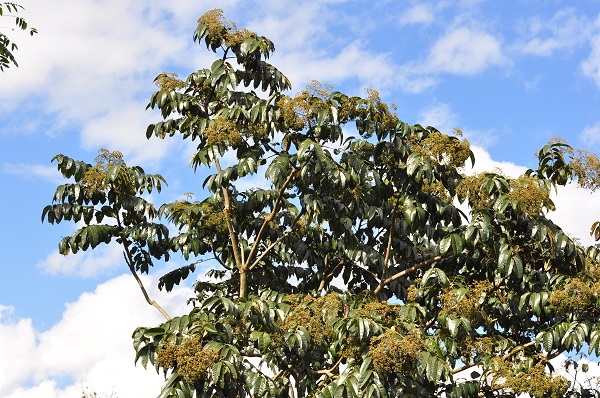Maqian (Zanthoxylum myriacanthum var. pubescens Huang (Huang)) is a valuable traditional Dai herb medicine found in the south of Yunnan province of China. Researchers from Xishuangbanna Tropical Botanical Garden (XTBG) have done much research on this Dai medicine. As a part of our ongoing search for bioactive secondary metabolites from Chinese tropical medicinal plants, XTBG researchers made a careful investigation on the chemical constituents of Maqian bark. They reported the chemical constituents of the petroleum ether extract and the ethyl acetate extract, and the anti-inflammatory of the bark of Maqian (Zanthoxylum myriacanthum var. pubescens) for the first time. In their study, 44 compounds in the petroleum ether extract were identified with gas chromatography–mass spectrometry (GC-MS). 18 compounds in the ethyl acetate extract were isolated by phytochemical methods and identified by chemical and spectral analyses. All extracts showed anti-inflammatory activity. The petroleum ether and ethyl acetate extracts have potent anti-inflammatory activity by decreasing nitric oxide(NO; an endogenous free radical), TNF-α (a key pro-inflammatory cytokine) and IL-1β ( interleukin-1β) production in LPS( lipopolysaccharide)-induced RAW264.7 and THP-1 cells. 3(2H)-benzofuranone show a certain extent of anti-inflammatory activity on inhibiting NO and TNF-α release. Decarine, an alkaloid isolated and identified from the ethyl acetate extract, has anti-inflammatory activities on inhibiting the production of NO, TNF-α and IL-1β in LPS-treated macrophages, and inhibiting the production of IL-6 and IL-8 in Caco-2 cells induced by IL-1β and TNF-α. The IC50 values of decarine by inhibiting the production of NO are 48.43 μM on RAW264.7 cells. The results provided a theoretical and material basis for the development and utilization of Maqian bark, a unilateral Dai medicine, and contributed to the standardization of Dai medicine. The study entitled “Chemical constituents and anti-inflammatory activities of Maqian (Zanthoxylum myriacanthum var.pubescens) bark extracts” has been published in Scientific Reports. Contact SONG Qishi, Ph.D Principal Investigator
Key Laboratory of Tropical Plant Resources and Sustainable Use, Xishuangbanna Tropical Botanical Garden, Chinese Academy of Sciences, Menglun 666303, Yunnan, China
E-mail: songqs@xtbg.ac.cnMaqian (Zanthoxylum myriacanthum var.pubescens) (Image by XU Youkai) |

